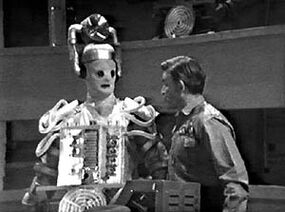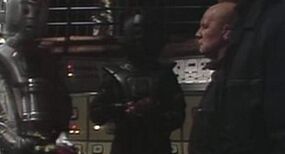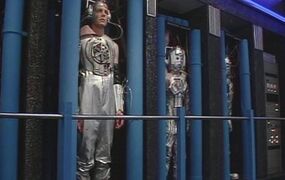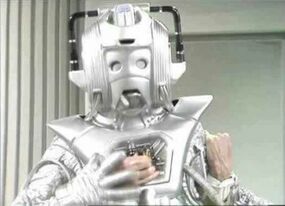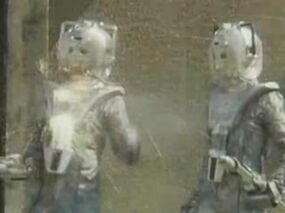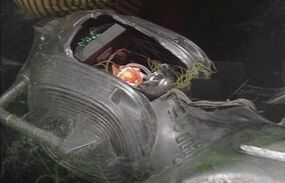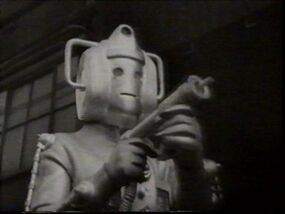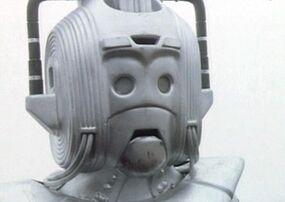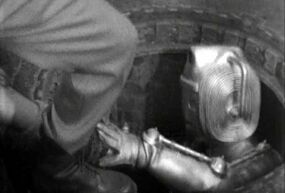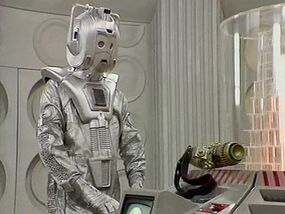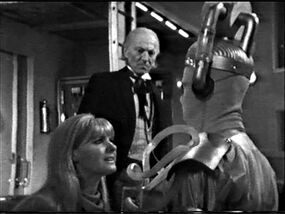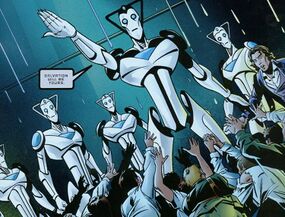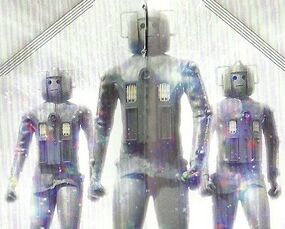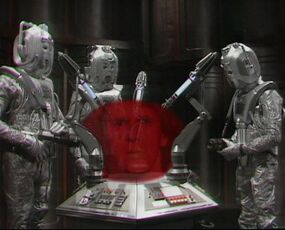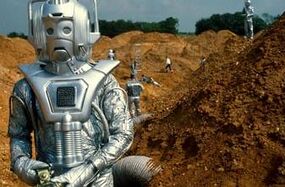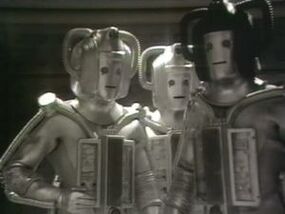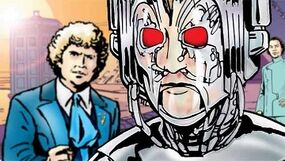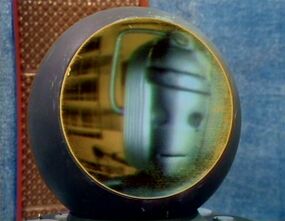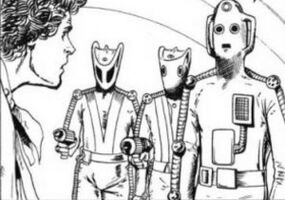Cyberman: Difference between revisions
(Undo revision 1649822 by 98.22.143.5 (talk) According to this wiki's policies, we don't "consider" a canon, but treat all media with equal weight. (T:VS, T:NPOV)) |
|||
| Line 200: | Line 200: | ||
By the [[101st century]], the Cybermen had nearly died out. Several centuries earlier, they had chosen a [[Cyberlord|new name]] for their species and become pacifists. ([[PROSE]]: ''[[Synthespians™]]'') | By the [[101st century]], the Cybermen had nearly died out. Several centuries earlier, they had chosen a [[Cyberlord|new name]] for their species and become pacifists. ([[PROSE]]: ''[[Synthespians™]]'') | ||
The Cybermen would ultimately transcend into pure energy. They would redeem the whole of sentient life and become the most peace loving-species in the whole of creation, purely thought with no physical presence. ([[COMIC]]: ''[[The World Shapers (comic story)|The World Shapers]]'') | The Cybermen would ultimately transcend into pure energy. They would redeem the whole of sentient life and become the most peace loving-species in the whole of creation, purely thought with no physical presence. ([[COMIC]]: ''[[The World Shapers (comic story)|The World Shapers]]'') | ||
=== Undated events === | === Undated events === | ||
Revision as of 23:09, 11 January 2014
- You may wish to consult
Cyberman (disambiguation)for other, similarly-named pages.
The Cybermen of the Doctor's universe, sometimes known as Normal Space, were a race of artificially modified humans who originated from the planet Mondas, Earth's twin planet. (TV: The Tenth Planet)
The Cybermen took it as their primary aim to conquer the universe, converting where possible to boost their numbers. Fear of such conversion was prevalent on many worlds and so the Cybermen came to be objects of terror. (TV: Attack of the Cybermen)
Characteristics
Variants
The Cybermen were cybernetically augmented humanoids. Though they varied greatly in design over time (most likely due to the technology available to them), the many versions had several things in common. Nearly all were silver in colour, except for a black variety in the London sewers. (TV: Attack of the Cybermen et al.)
Cybermen also exhibited exposed circuitry and tubing covering a rubbery or mylar-like outer skin. (TV: The Tenth Planet) Cybermen frequently attempted to increase their numbers by cyber-conversion.
The Mondasians which the First Doctor met on Snowcap Base in December 1986 had undergone a less radical conversion and still retained biological hands. (TV: The Tenth Planet)
All other Cybermen were entirely covered by their metallic suits. (TV: The Moonbase onwards) Some partial conversions were known to exist that still held human features, among them Tobias Vaughn. (TV: The Invasion)
The Cybermen on the Moonbase and those released by Eric Klieg on Telos were slim. (TV: The Moonbase, The Tomb of the Cybermen) The ones which infiltrated Briggs' freighter in 2526 had bulkier, more imposing forms. (TV: Earthshock) Cybermen like these also existed in the 1980s. (TV: Silver Nemesis)
Mondasian Cybermen had a quavering voice which put inflected syllables in a seemingly random, sing-song manner. (TV: The Tenth Planet) Later Cybermen spoke in more of a monotone, emphasising their lack of emotion. (TV: The Moonbase)
Conversion
Cyber-conversion was the process by which compatible beings were physically and mentally altered into Cybermen. This process was necessary for the Cybermen to increase in number. It was carried out at many locations. (TV: Attack of the Cybermen)
Partial conversions occurred. In a partial conversion, the subject took on several features of the Cybermen. For example, Tobias Vaughn's torso was immune to gunfire. (TV: The Invasion) Other partial conversions involved the covering of some areas of the body in armour, leaving bare skin in others. This type of partial conversion could be caused by scarcity of parts and lack of time. (TV: Cyberwoman)
Vulnerabilities
Cybermen had major weaknesses. The most notable was the element gold which, being non-corrosive, choked their respiratory systems, a property exploited by the glittergun used during the Cyber-Wars. (TV: Revenge of the Cybermen, Earthshock, Silver Nemesis) On occasion, the mere touch of gold was toxic to them. Gold coins or gold-tipped arrows might destroy them. (TV: Earthshock, Silver Nemesis) Gold also blocked their sensors and caused the cybermats to malfunction. (PROSE: Revenge of the Cybermen)
Other weaknesses of the Cybermen included the combination of solvents known as Cocktail Polly (TV: The Moonbase) and excessive levels of radiation. (TV: The Tenth Planet)
Cybermen affected by the Cerebration Mentor, an emotion-enhancing device, went "mad". (TV: The Invasion)
20th century guns could damage Cybermen, but did not kill them. Explosives and bazooka shells took them down easily. (TV: The Invasion, Silver Nemesis) UNIT developed gold-tipped rounds to combat Cybermen. (TV: Battlefield) At close range, attacks with energy and laser weapons could kill Cybermen. (TV: Earthshock)
Raston Warrior Robots counted Cybermen among the many beings they could kill. Although equipped only with javelins and blades, the technology of the robots allowed them to easily destroy several Cybermen. (TV: The Five Doctors)
Technology
The Cybermen forces in 2526 used the Cyberlance, a powerful, hand-held cutting weapon. They also used the Cyberscope, a device that allowed Cyber commanders to view the battlefield remotely and access a computer database (containing, among other data, information on their race's encounters with the Doctor). (TV: Earthshock)
Cybermen in 1986 had a built-in distress signal in their heads that could be activated manually. (TV: Attack of the Cybermen)
The chest unit of a Cyberman is vital to the operation of its life support system. (AUDIO: Telos)
Should the Cybermen have acquired time travel, they would have become strong enough to crush the Draconians, the Sontarans and even the Daleks. (WC: Real Time)
Weapons (Short Range)
When they attacked Earth in 1986, Cybermen carried large, hand-held, energy weapons. (TV: The Tenth Planet)
On the Moon in 2070, Cybermen could produce arcs of electricity from their hands to stun and disable. (TV: The Moonbase)
In the 21st century, the Cybermen who attacked Space Station W3 had death rays built into their chest units. (TV: The Wheel in Space)
The Cybermen encountered by UNIT in the late 20th century displayed these same built-in weapons. They also carried large rifles for medium range combat on London's streets. (TV: The Invasion)
The Cybermen who attacked the Nerva Beacon had their weapons built into their helmets. They were activated with the touch of a hand. (TV: Revenge of the Cybermen)
In time, the Cybermen came to favour the hand-held cyber-gun over the built-in weapon. (TV: The Invasion onwards)
Weapons (Other)
In the 20th century, the Cybermen invasion fleet had a megatron bomb that could destroy all life on Earth. (TV: The Invasion)
In 2070, the Cybermen had a cannon which could operate in the vacuum of Space. They used it on the surface of the Moon. Due to its mass, it required two Cybermen to operate it. (TV: The Moonbase)
Cybermen in 2526, the invaders of Voga, and the Cybermen removed by Time Scoop to the Death Zone had portable cyber-bombs that could devastate planets. (TV: Earthshock, Revenge of the Cybermen, The Five Doctors)
Neurotrope X incapacitated humans before the Cybermen made an overt move. (TV: The Moonbase) Cybermen sometimes used Cybermats to spread the virus to the population. (TV: Revenge of the Cybermen)
The Cybermen were strong enough to kill with their hands without any extra weaponry or electric-based attack. (TV: Earthshock)
Culture
Cybermen made survival their central objective. Since they could not reproduce naturally, they needed to create new members of their population by other means, via cyber-conversion. At times they tended to focus on converting the population of Earth, at other times on simply destroying it. (TV: The Tomb of the Cybermen)
Cybermen tended toward covert activity, scheming from hiding and using human or other agents, cybermats or androids to act as their proxies until they appeared. (TV: Revenge of the Cybermen, Earthshock, Attack of the Cybermen)
Individuality and emotion
Throughout their history, Cybermen, for the most part, lacked individuality or names. This was a result of their emotions being removed during the conversion process. (TV: The Tenth Planet, et al.)
A few Cybermen had individual names such as Krang (TV: The Tenth Planet) or Kroton. (COMIC: Throwback: The Soul of a Cyberman)
- In the script and cast listings for The Tenth Planet the individual Cybermen had names. They were Krail, Talon, Shav, Krang, Jarl and Gern. (REF: Doctor Who: The Encyclopedia)
Cybermen in positions of authority included the ground level Cyber-Leader who commanded a group of ordinary Cybermen. Cyber-Leaders were sometimes aided by a Cyber-Lieutenant. Immobile computer-like Cyber-Planners would sometimes make decisions and long term plans. (TV: The Wheel in Space, The Invasion) The Cyber-Controllers, who possessed enlarged craniums, had the position of highest possible authority. (TV: The Tomb of the Cybermen, Attack of the Cybermen)
Cybermen no longer possessed emotions and viewed them as a weakness. However, several of the Cyber-Leaders displayed characteristics that could be linked to emotions such as anger, amusement, and, at times, smugness. (TV: Earthshock)
History
Early history
Cybermen were originally a wholly organic species of humanoids who arose on Earth's former twin planet, Mondas. Mondas drifted into the outer solar system to become an orphan planet. The Mondasians adapted by turning themselves into cyborgs. (TV: The Tenth Planet) Eventually all of the Mondasians underwent forced cyber-conversion. (AUDIO: Spare Parts)
- See Creation of the Cybermen for more details.
The original Mondasians retained more of their organic form. They had personal names. Another group, the Faction, left Mondas and headed for Planet 14. These developed into groups without connection to one another. (PROSE: Iceberg)
Mondas developed a drive propulsion system. This was placed in the planet's core to move the entire world. As the original Cybermen were limited in numbers and were continually being depleted, they decided to invade Earth. (TV: The Tenth Planet)
Middle history
20th century
In 1903, after receiving a wealth of information from the future, Grigori Rasputin saw people made of metal. (AUDIO: The Wanderer)
The Seventh Doctor and Ace fought Cybermen in London in 1940. (PROSE: Illegal Alien) They would later fight them in Nevada in 1954. These Cybermen were from Mondas, trying to invade. Their attack was delayed until 1986. (COMIC: The Good Soldier)
By 1970, Cybermen, specifically the Faction led by a Cyber-Planner (PROSE: Iceberg), had established a base on the dark side of Earth's Moon. The Cyber-Planner had contacted the industrialist Tobias Vaughn, the head of the International Electromatics corporation. Vaughn installed mind control circuits in his company's appliances, paving the way for an invasion. He also grafted cybernetic arms onto several of his workers.
Vaughn had a Cyber-Planner installed in his office. The plot was uncovered by the newly formed UNIT and the Second Doctor, who helped avert the invasion on the Earth and at the Cyberman base on the Moon. (TV: The Invasion)
From the mid 1970s through 1985, Cybermen lurked in the sewers below London, awaiting another invasion. (TV: Attack of the Cybermen) This would happen in December 1986. (TV: The Tenth Planet) At some point a Cyberman's head was taken and was stored in Henry van Statten's Vault, where he held alien artifacts. According to its label, it was recovered from the London sewers in 1975. (TV: Dalek)
Having captured a time vessel, the Cybermen knew that the First Doctor would eventually destroy Mondas. They planned to divert Halley's Comet towards Earth in 1985. They hoped the destruction of Earth would change the past so Mondas would survive. The Sixth Doctor foiled them. (TV: Attack of the Cybermen)
In December 1986, the First Doctor met an advance force of Mondans near Snowcap Base in Antarctica. This force was to prepare for Mondas' return to the Sol system and to drain Earth's energy for the Cybermen. Mondas absorbed too much energy and was destroyed, as were the Cybermen on Earth who depended on Mondas for power. (TV: The Tenth Planet) Following the destruction of Mondas, the Cyberman would make Lonsis their new home. (AUDIO: Human Resources) One account also claims that the Cyberships were examined and exploited by humans, allowing them to make advances in space travel. Sarah Jane Smith described the invasion as "both the greatest disaster and most astonishing blessing ever to have happened to the human race." (PROSE: The Power of the Daleks)
In November 1988, a scouting party was sent to Earth in search of a statue made of validium called Nemesis, a Time Lord weapon. The Cybermen met Lady Peinforte, who brought many of their number down with gold-tipped arrows. The Leader apparently forced the Seventh Doctor to surrender the Nemesis. Their Force was destroyed by Nemesis as the Doctor had instructed. (TV: Silver Nemesis)
21st century
In 2000, the Cybermen infected the Earth computers with a virus that removed all vowels. (PROSE: Vrs)
In the mid-2000s, Cybermen from the future time travelled to Earth to announce themselves to the public. They hoped to flood Earth, believing any survivors would willingly undergo cyber-conversion. (COMIC: The Flood)
In 2006, Cybermen again invaded Earth's South Pole. (PROSE: Iceberg) In the same year, the Cybermen on Lonsis tried to invade Earth via the portal in the main branch of Hulbert Logistics.The Eighth Doctor and Lucie Miller destroyed them. They used a quantum crystalliser to make the Cybermen and their ship rapidly rust into dust. This was the last of the original Cybermen. (AUDIO: Human Resources)
In 2008 several Cybermen and a Cyber-Planner who were allergic to gold attempted to gain Time travel. They converted Bryon but their ship was destroyed by Charlotte Pollard (AUDIO: The Girl Who Never Was)
In 2021 a group of Cybermen pretended to want to become organic again. A space program used this to their advantage. However the Cyberleader lied, in fact having tricked the agency into creating a conversion chamber. The Seventh Doctor, Ace and Hex foiled this scheme. (AUDIO: The Harvest)
In the middle to late 21st century, Space Station W3 was the site of a takeover by the Faction, but were defeated by the Second Doctor. (TV: The Wheel in Space) In a second attack on the wheel, the Cybermen were sent into the Land of Fiction by Zoe Heriot. (AUDIO: Legend of the Cybermen)
By 2070, the Cybermen were known and feared in several galaxies (PROSE: Doctor Who and the Cybermen) but were thought extinct by Earth. At this time the Earth's weather was controlled by the Gravitron installation in the Moonbase, the Faction planned to use the Gravitron to disrupt Earth's weather and destroy all life on the planet. (TV: The Moonbase)
Post-21st century
The Space Marines fought the Cybermen on Titan 317 in the latter half of the 22nd century. (PROSE: The Janus Conjunction)
The Sixth Doctor encountered Cybermen in 2191. By using a Selachian ship the Cybermen had conquered Agora. (PROSE: Killing Ground)
The Cybermen invaded an Archaeological site on Aprilia III and began to convert the people onboard into Cybermen. They encountered the Fourth Doctor, Captain James T. Kirk, Spock, McCoy and Scotty. The Fourth Doctor stopped them by using the gold on Kirk's communicator to clog the Cybermen's respiration. (COMIC: Assimilation²)
The Cybermen entered into an alliance with another cybernetic species, the Borg, from a Federation due to their identical goals of assimilating other species. On Stardate 45635.2 in 2368, a joint Borg/Cyberman assault force attacked the Federation planet Delta IV and quickly overran it. This attack made the Cybermen known to the Federation. (COMIC: Assimilation²)
The Cybermen had all but passed into legend when an archaeological expedition on the planet Telos found the Cyber-tombs. Hordes of Cybermen waited in cryogenic suspension. Earth's Brotherhood of Logicians intended to awaken them, believing the Cybermen would be receptive to their cause. The tomb would be sealed again (TV: The Tomb of the Cybermen) and later re-activated. (TV: Attack of the Cybermen)
Cyber-Wars
During the Orion War of the early 26th century, humans tried to salvage Cyber-Technology from derelict ships to defeat the androids. This led to both sides nearly wiped out and the temporary conquest of Earth before the Cybermen resurgence was stopped. (AUDIO: Sword of Orion, AUDIO: Cyberman)
In 2526, several planets united to oppose the Cybermen in an event called the Cyber-Wars. A force of Cybermen tried to devastate Earth with a Cyberbomb and convert the survivors. Failing this, they hoped to crash the freighter into Earth and cause an ecological disaster. Although the effort failed, the freighter was catapulted back in time to become the "meteor" that wiped out the dinosaurs. (TV: Earthshock)
One of the last acts of the Cybermen in this war the attempt to blow up the planet Voga to stop the production of glitterguns. (PROSE: Revenge of the Cybermen) In the aftermath of their failure, the Cybermen were reduced to scattered remnants. One group relentlessly hounded the remaining fragment of Voga. (TV: Revenge of the Cybermen)
The war ultimately ended when the Tiberian spiral galaxy was blown up, destroying apparently all of the Cybermen. (TV: Nightmare in Silver)
Later history
On Telos, the Cybermen plotted to change history and divert Halley's Comet to Earth to destroy it and to save Mondas. (TV: Attack of the Cybermen) At some point, Telos was shattered by an asteroid impact. (AUDIO: Telos)
Telos was not the only site of Cyber-Tombs. There were dozens across the galaxy and more wars were started. Bernice Summerfield spoke of the Telos expedition and other tombs being discovered in the past tense. She was sent to one by Irving Braxiatel in the early 27th century. Braxiatel intended to use the Cybermen as a private army but was thwarted. (AUDIO: The Crystal of Cantus)
The Tremas Master sent The Graak to a Cyber-Tomb populated by Cybermen to steal a Cybermat. These Cybermen were either going in- or coming out of the tombs. (GAME: Destiny of the Doctors)
Around 2875, the remaining Cybermen from the Cyber-Wars ship finally caught up to Voga, now in orbit around Jupiter. Their attempt to destroy it would be defeated and their craft and themselves detroyed due to the involvement of the Fourth Doctor, Sarah Jane Smith, and Harry Sullivan. (TV: Revenge of the Cybermen)
By 3286, the Cybermen had been thought dead for centuries. A group of these Cybermen led by a Cyber-controller attempted to gain time travel. Around this time, Goddard arrived. Goddard was a super developed Cybermen,from an alternate 1930s where the human race had become cyborgs indistinguishable visually from humans thanks to a Cyber virus. The Cybermen manged to reverse-engineer the virus Goddard brought but were defeated by the Sixth Doctor. (WC: Real Time, AUDIO: Real Time)
Cybermen from the far future would use time travel to return in time to the 2000s to convert Earth. They used rain that caused extreme emotions (sadness, fear, anger) to convince the humans that emotions were bad and to accept conversion willingly. The reason they needed humans from a past era was clear to the Doctor; in the future of the Cybermen, the human genetic template had been corrupted and augmented by their interactions with many alien races. The Cyber-conversion protocols were keyed to human or Mondasian biology; the number of available converts would drop dramatically.
The Doctor offered to regenerate for them so they could gather the data of his regeneration and upgrade their conversion protocols to include other races, in exchange for leaving the Earth alone. The Cybermen agreed, but betrayed him at the last moment (the Doctor was expecting this). Using the fragment of the Time Vortex the future Cybership used as a power source, the Doctor destroyed the Cyberfleet and dissolved them into rain. (COMIC: The Flood)
At some point, the Cybermen were destroyed along with the Tiberian spiral galaxy. Thought to be extinct, several Cybermen lay beneath the future site of Hedgewick's World of Wonders. When the theme park was built, the Cybermen began using Cybermites to kidnap people as "spare parts". Angie and Artie Maitland arrived on Hedgewick's World with the Eleventh Doctor and their nanny, Clara, and were taken by the Cybermen. With enough components to reawaken them, after being presumed extinct for a thousand years, the Cybermen awoke from their tombs.
The Cybermen began attacking Natty Longshoe's Comical Castle to convert the humans there, but the Doctor, in a battle for his mind with the Cyber-Planner, Mr Clever, had them stop in place to bring in the local resources to win the chess game. The Doctor used a hand pulse to redistribute Clever among the rest of the Cybermen. Angie and Artie were also released. Emperor Ludens Nimrod Kendrick Cord Longstaff XLI gave the verbal command to start the countdown of a planet-imploding bomb. This drew the attention of his ship, which transmatted the Doctor and the humans on the planet while the Cybermen were left behind. The planet and the Cybermen were destroyed; however, one Cybermite survived the destruction. (TV: Nightmare in Silver)
Final evolution
By the 101st century, the Cybermen had nearly died out. Several centuries earlier, they had chosen a new name for their species and become pacifists. (PROSE: Synthespians™)
The Cybermen would ultimately transcend into pure energy. They would redeem the whole of sentient life and become the most peace loving-species in the whole of creation, purely thought with no physical presence. (COMIC: The World Shapers)
Undated events
- During the Dark Times on Gallifrey, the Cybermen were excluded from the games in the Death Zone, because the Time Lords believed they had an unfair advantage over other victims of the games. Borusa, having found the Game of Rassilon, transported a squadron of Cybermen to the Death Zone to threaten and harass the Third Doctor and Sarah Jane Smith. These Cybermen were mostly destroyed by a similarly transported Raston Warrior Robot. The survivors allied with the Tremas Master, but he betrayed and destroyed them. (TV: The Five Doctors)
- The Seventh Doctor and Catherine Broome encountered the Cybermen (PROSE: Companion Piece)
- A Cyberman was among the life-forms exhibited in Vorg's Miniscope. (TV: Carnival of Monsters)
- The Cybermen were part of the Supremo's alliance in the war against Morbius. (PROSE: Warmonger)
- The remains of one Cybermen were put on sale at the Maldovarium market. The Eleventh Doctor purchased the Cyberman's head and called him "Handles". (TV: The Time of the Doctor)
- The Cybermen were involved in the Siege of Trenzalore. After being summoned to Trenzalore by the First Question, the Cybermen attempted to pass through the Papal Mainframe's force field. One attempt involved a wooden Cybermen as it was low-tech and would not trigger any alarm system but the Doctor tricked the Cyberman into destroying itself. Later, the Daleks attacked the Mainframe and learned how to break the force field. The Cybermen followed them and fought the Doctor and the Silents until all the Cybermen, like many other species involved in the battle, were either killed or saw fit to retreat. (TV: The Time of the Doctor)
Alternate timeline
it's difficult to tell, given its lack of a proper resolution after ten years, but Real Time seems to involve some sort of divergent timeline
In an alternate timeline created by the Black Guardian, the First Doctor never left Gallifrey. He became Lord President. The Cybermen were one of many aliens which invaded Earth, and fought over the planet with other races. This timeline was destroyed when the Seventh Doctor retrieved the Key to Time. (COMIC: Time & Time Again)
Other references
- An image of a Cyberman was one of the fears pulled from the Doctor's mind when he faced the Keller machine. (TV: The Mind of Evil)
- In their war with the Cybermen of another universe, the Cult of Skaro noted their resemblance to the Cybermen from our universe. (TV: Doomsday)
Mysteries and discrepancies
- On Telos, the Second Doctor seemed to have knowledge, if not foreknowledge of the Cyber-Tombs. (TV: The Tomb of the Cybermen) The Cyber-Planner's reference to having met the Doctor on Planet 14 also remains obscure, (TV: The Invasion) though one account tries to explain this in a way which contradicts previously disclosed information about the creation of the Cybermen. (COMIC: The World Shapers)
Behind the scenes
Inspiration for the Cybermen
The idea for the Cybermen came from Kit Pedler's interest in new medical advances and his fears of where they might lead. Early concepts of the Cyberman design emphasised the "man" part of the name, but the proposed design would have cost too much money. Indeed, the televised version of The Tenth Planet featured much more human-like Cybermen with human hands.
Prologues to certain Target Books novelisations reflect the earlier ideas about the Cybermen and state they perfected the science of cybernetics to gain immortality. The Cybermen were the result: immortal, but at the price of loss of their humanity.
Development of the characters
The second appearance of the Cybermen in The Moonbase (pre-planned by the production team even before The Tenth Planet had aired), re-designed them radically, making them much more robotic in appearance. The Cybermen went through another major re-design in The Invasion, yet another in Earthshock, one in the comic strips in The Flood and one more in Nightmare in Silver. Minor re-designs would take place as well. As the Cybermen stories do not appear in a chronological order, this makes their evolution rather confusing; more 'advanced' Cybermen are around at the same time as more 'primitive' ones. This can be explained by time travel, though the Cybermen only captured one time ship. (TV: Attack of the Cybermen)
The Brilliant Books
The non-narrative sources REF: The Brilliant Book 2011 and The Brilliant Book 2012 had further information about Cybermen.
- According to The Brilliant Book 2011, at Blenheim Palace, the Fourth Doctor was hunting Cybermats, suggesting Cybermen activity.
- According to The Brilliant Book 2012, at one point, Vastra and Jenny battled the Cybermen.
Cybermen
The non-narrative source Doctor Who: Cybermen, by David Banks, went into further detail about Cybermen and Cyberman factions. Banks created a number of terms — CyberFaction, CyberNomad, CyberTelosian, CyberMondasian, and others — to explain the differences in the Cybermen's costumes on television. Some of the terms, in adapted forms, appear in his later novel, PROSE: Iceberg. It is these forms — Mondan and the Faction, which this wiki prefers, according to our canon policy.
The history Banks presented as "non-fiction" was largely ignored by other authors and so can't be considered in the writing of most of our articles. Here are some of the points that Banks made which never made it beyond Doctor Who: Cybermen:
- The departure of the CyberFaction (that is, the Faction) from Mondas was thought to have occurred around 5000 BC in what Banks called the "First Divergence".
- In the "Second Divergence", a group which author David Banks called "CyberNomads" diverged from the Faction. These so-called "Nomads" searched for the validium statue Nemesis and tried and failed to destroy Voga.
- Possibly after the 21st century, the Faction abandoned their home in the Sol system and journeyed into the galaxy to colonise a suitable planet. The Cybermen which colonised Telos, possibly in 2175, split from the Faction and were called the CyberTelosians. This group united with the CyberNomads after they discovered the frozen CyberTelosians, and became CyberNeomorphs. These Cybermen planned to use Halley's Comet against Earth and were taken to the Death Zone on Gallifrey.
In other words, what Banks was trying to do was create terms for each of the different costumes he and his fellow performers had worn throughout the years. In effect he was saying that the costumes in Attack of the Cybermen were of CyberNeomorphs, the ones worn in The Tomb of the Cybermen were of CyberTelosians, and so forth.
The idea has not been widely ignored by other works. Even he did not in his book, Iceberg, which mentioned none of his terms precisely. It did not refernce the CyberNeomorphs and CyberTelosians, and called the CyberFaction, "the Faction", and CyberMondasians, "Mondans".
| |||||||||||||||||
